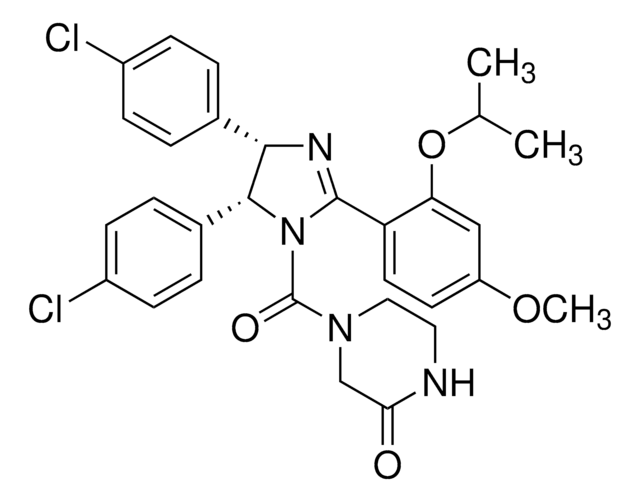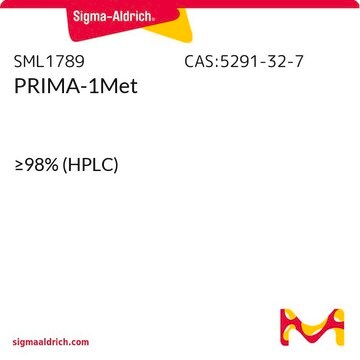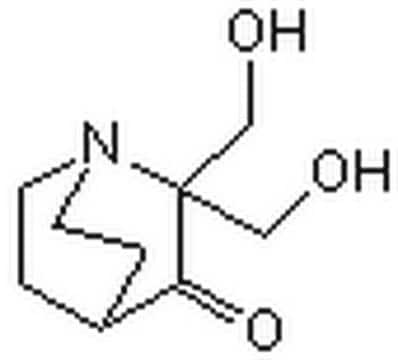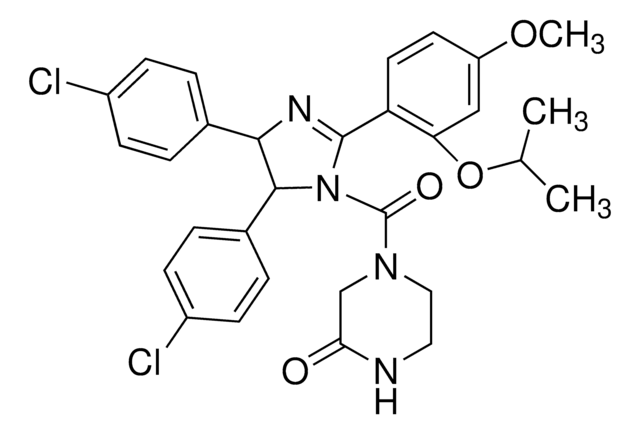P0069
PRIMA-1
≥98% (HPLC), solid
Synonym(s):
2,2-Bishydroxymethyl-1-aza-bicyclo[2.2.2]octan-3-one
Sign Into View Organizational & Contract Pricing
All Photos(1)
About This Item
Empirical Formula (Hill Notation):
C9H15NO3
CAS Number:
Molecular Weight:
185.22
MDL number:
UNSPSC Code:
12352200
PubChem Substance ID:
NACRES:
NA.77
Recommended Products
Quality Level
Assay
≥98% (HPLC)
form
solid
color
white to off-white
solubility
H2O: >10 mg/mL
storage temp.
2-8°C
SMILES string
OCC1(CO)N2CC[C@@H](CC2)C1=O
InChI
1S/C9H15NO3/c11-5-9(6-12)8(13)7-1-3-10(9)4-2-7/h7,11-12H,1-6H2
InChI key
RFBVBRVVOPAAFS-UHFFFAOYSA-N
General description
P53-dependent reactivation and induction of massive apoptosis (PRIMA-1) is a low molecular weight compound and has a role in cancer therapy. PRIMA-1 stimulates cytotoxic effects in human cancer cells. It induces eryptosis.
Biochem/physiol Actions
PRIMA-1 is a selective re-activator of mutant p53 activity in tumor cells, and an inducer of apoptosis and inhibitor of growth of human tumors with mutant p53. Mutations in the tumor suppressor p53 take place in >50% tumor cells. PRIMA-1 selectively restores sequence-specific DNA binding and transactivational activity to mutant p53 proteins at μM concentrations. PRIMA-1 works as a re-activator of the apoptotic function of mutant p53 via conformational modulation of function-specific epitopes.
Signal Word
Danger
Hazard Statements
Precautionary Statements
Hazard Classifications
Acute Tox. 4 Oral - Resp. Sens. 1
Storage Class Code
11 - Combustible Solids
WGK
WGK 3
Flash Point(F)
Not applicable
Flash Point(C)
Not applicable
Personal Protective Equipment
dust mask type N95 (US), Eyeshields, Gloves
Choose from one of the most recent versions:
Already Own This Product?
Find documentation for the products that you have recently purchased in the Document Library.
Federica Eduati et al.
Molecular systems biology, 16(2), e8664-e8664 (2020-02-20)
Mechanistic modeling of signaling pathways mediating patient-specific response to therapy can help to unveil resistance mechanisms and improve therapeutic strategies. Yet, creating such models for patients, in particular for solid malignancies, is challenging. A major hurdle to build these models
PRIMA-1 as a cancer therapy restoring mutant p53: A review
Lewis EJ
Bioscience Horizons, 8 (2015)
Masashi Idogawa et al.
Oncotarget, 5(17), 7540-7548 (2014-10-04)
p53 transduction is a potentially effective cancer therapy but does not result in a good therapeutic response in all human cancers due to resistance to apoptosis. To discover factors that overcome resistance to p53-induced apoptosis, we attempted to identify RNAi
Stimulation of suicidal erythrocyte death by PRIMA-1
Faggio C, et al.
Cellular Physiology and Biochemistry, 35(2), 529-540 (2015)
Effects of PRIMA-1 on chronic lymphocytic leukaemia cells with and without hemizygous p53 deletion
Nahi H, et al.
British Journal of Haematology, 127(3), 285-291 (2004)
Our team of scientists has experience in all areas of research including Life Science, Material Science, Chemical Synthesis, Chromatography, Analytical and many others.
Contact Technical Service








